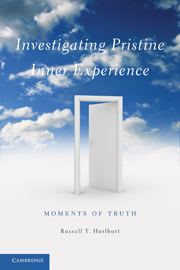Book contents
- Frontmatter
- Contents
- List of Figures and Tables
- Preface
- Acknowledgments
- 1 Moments of Truth
- 2 Fragmented Experience in Bulimia Nervosa
- 3 Apprehending Pristine Experience
- 4 Everyday Experience
- 5 Moments Are Essential
- 6 Experience in Tourette's Syndrome
- 7 The Moment (Not): Happy and Sad
- 8 Subjunctification
- 9 Before and After Experience? Adolescence and Old Age
- 10 Iteration Is Essential
- 11 Epistemological Q/A
- 12 A Consciousness Scientist as DES Subject
- 13 Pristine Experience (Not): Emotion and Schizophrenia
- 14 Multiple Autonomous Experience in a Virtuoso Musician
- 15 Unsymbolized Thinking
- 16 Sensory Awareness
- 17 The Radical Non-subjectivity of Pristine Experience
- 18 Diamonds versus Glass
- 19 Into the Floor: A Right-or-Wrong-Answer Natural Experiment
- 20 The Emergence of Salient Characteristics
- 21 Investigating Pristine Inner Experience
- Appendix: List of Constraints
- References
- Index
21 - Investigating Pristine Inner Experience
Published online by Cambridge University Press: 05 June 2012
- Frontmatter
- Contents
- List of Figures and Tables
- Preface
- Acknowledgments
- 1 Moments of Truth
- 2 Fragmented Experience in Bulimia Nervosa
- 3 Apprehending Pristine Experience
- 4 Everyday Experience
- 5 Moments Are Essential
- 6 Experience in Tourette's Syndrome
- 7 The Moment (Not): Happy and Sad
- 8 Subjunctification
- 9 Before and After Experience? Adolescence and Old Age
- 10 Iteration Is Essential
- 11 Epistemological Q/A
- 12 A Consciousness Scientist as DES Subject
- 13 Pristine Experience (Not): Emotion and Schizophrenia
- 14 Multiple Autonomous Experience in a Virtuoso Musician
- 15 Unsymbolized Thinking
- 16 Sensory Awareness
- 17 The Radical Non-subjectivity of Pristine Experience
- 18 Diamonds versus Glass
- 19 Into the Floor: A Right-or-Wrong-Answer Natural Experiment
- 20 The Emergence of Salient Characteristics
- 21 Investigating Pristine Inner Experience
- Appendix: List of Constraints
- References
- Index
Summary
I have tried, over the course of this book, to demonstrate ever more comprehensively that:
Pristine experience is personally important. You live your life entirely immersed in your pristine experiences, a stream of your own creations, tailored by you just for you, perhaps derivative of the surrounding environment, perhaps not. The stream of pristine experience is unfettered by time, place, or reality. At one moment you may be seeing in reality the book you are holding, at the next moment hearing and smelling in imagination the ocean that you visited last year, at the next moment experiencing yourself innerly saying “it's all politics” as part of imagining a conversation that will likely take place this coming evening.
Your pristine experience is your own ultimate intimacy: You create it; you shape it; you live in it; you're immersed in it every waking minute; no one else can access it.
You do not occupy the same experiential world as does anyone else. You live in your own individually created stream of pristine experiences and I live in mine, each stream independent of the other, each created more by our own individuality than anchored directly to events in the shared world.
Despite its ubiquity, people are often mistaken, sometimes hugely mistaken, about the features of their own pristine experience.
Pristine experience is scientifically important. Without a careful survey of pristine experience we are unlikely to be able to understand bulimia, adolescence, old age, schizophrenia, emotion, and perhaps most other topics in psychology.
[…]
- Type
- Chapter
- Information
- Investigating Pristine Inner ExperienceMoments of Truth, pp. 411 - 436Publisher: Cambridge University PressPrint publication year: 2011



